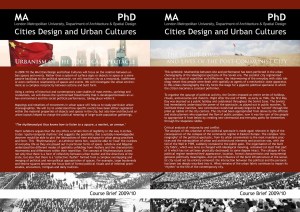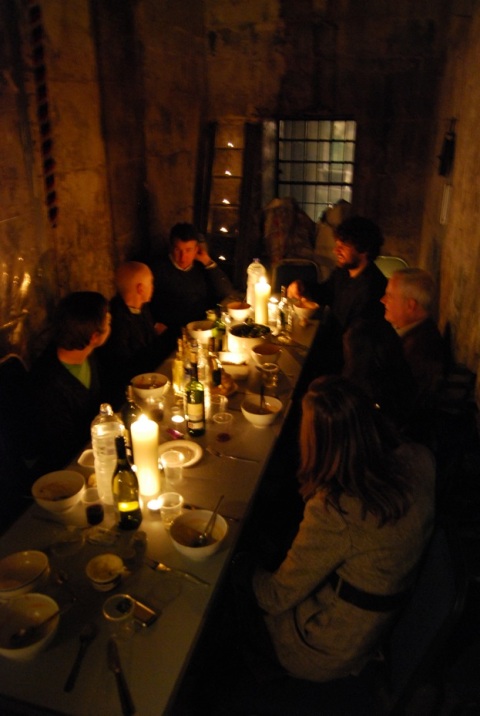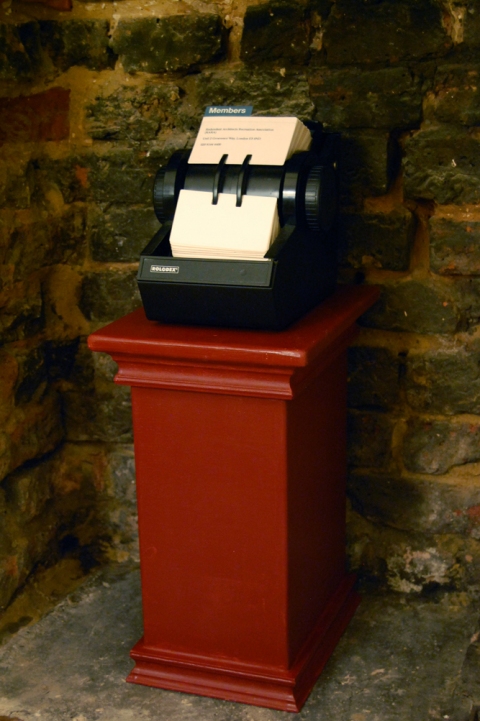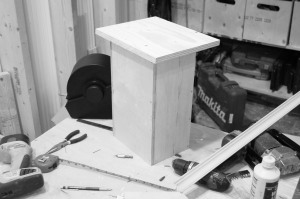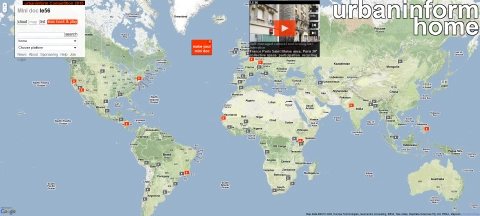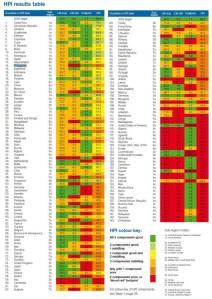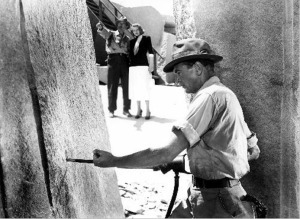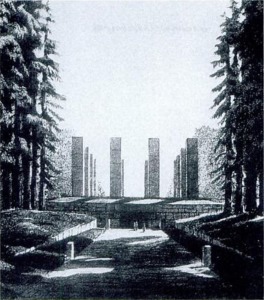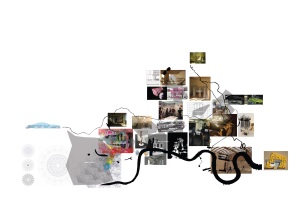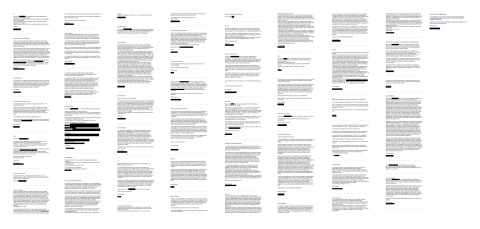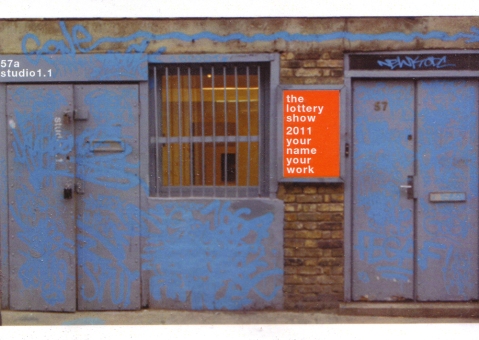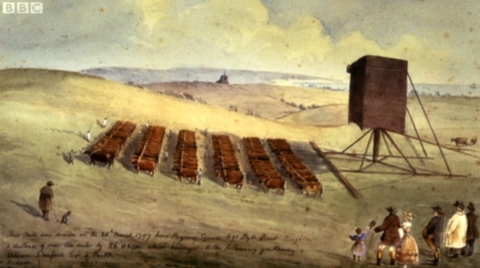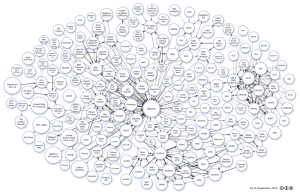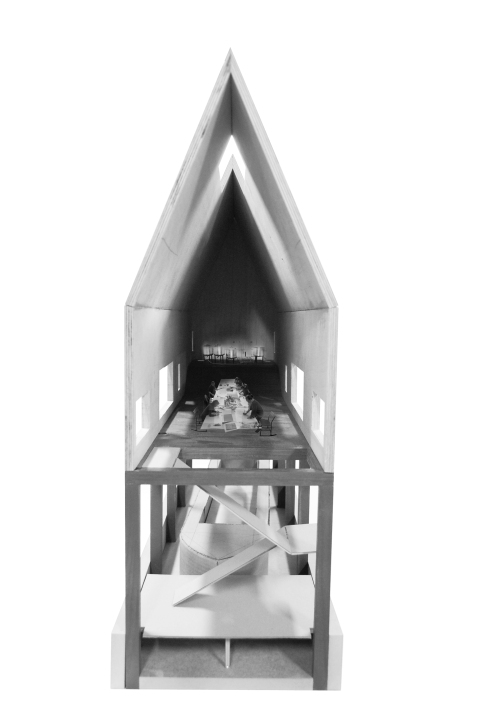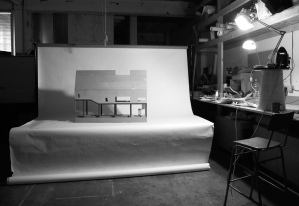Critical Transformations
November 16, 2010 Comments Off on Critical Transformations
At the beginning of the academic year final-year Diploma students chose a History & Theory module. I joined Critical Transformations, taught by Dr. Ines Weizman, who heads the MA Cities Design and Urban Cultures course at London Met ASD.
Both the framework and content of the module are of extreme interest to me, and relate directly not only to the RARA project this year, but to interests I’ve held from the beginning of my studies in architecture. I will be posting a lot of precedent material pilfered directly from Ines’s fascinating archive.
Battle of the Brands
November 16, 2010 Comments Off on Battle of the Brands
During the Free Unit feast there was some discussion of RARA vs. RIBA. Some agreed that becoming a chartered member of RARA would in many ways trounce having RIBA on one’s business card.
Above is the product of a short visit to my local Photoshop. T-shirts (and hostile institutional takeover) to follow.
Free Unit Signing & Feast 02.11.10
November 16, 2010 Comments Off on Free Unit Signing & Feast 02.11.10
The contract signing was a bit of an anti climax (of course) – a lot of work was done for the signing, and the focus was on presenting to the guest critics, without any reliance on unit tutors for helping to explain our projects. The critics, with their fresh set of eyes, could direct members into areas that they may not have considered, or interrogate the ideas into new areas.
We were also joined by the Seoul-based Free Unit members, through a Skype-connected laptop. Much hilarity ensued due to the 4 second time lagged rounds of applause after each presentation.
The guest critics were Anne Markey, the director of ASD Projects, London Met’s in-house RIBA chartered practice, and Lucy Musgrave, director of Publica (previousy director of General Public Agency and the Architecture Foundation). Both provided excellent analysis of our projects, and effortlessly ‘passed’ all projects for signing… except mine.
The objective of my year had perhaps become a little murky with the inclusion of creating secret societies – which I was interrogated about. Robert later noted that I sounded like a right wing fanatic, in my defence of Nazi monuments and secretive clubs. Needless to say I did pass, but only after espousing wild eyed nonsense that neither critic felt like countering.
The feast was held for the London-based Free Unit members in the spire of the church of St Mary Woolnoth, where Alex’s Free Unit project was based last year. Bara brought pig’s ears to snack on (only for the adventurous) and we were joined by Nick Boyarski, who will accompany the visit to Texas.
The Free Unit Contract
November 16, 2010 Comments Off on The Free Unit Contract
My Free Unit Contract is a redialled Rolodex on a plinth. Within the Rolodex lies a ‘closed’ network of individuals and organisations that RARA has been in contact with since its inception. Instead of being organised alphabetically, the network is organised into more pragmatic categories in tune with RARA:
- Members – previous paying users of RARA
- Publicity – individuals involved in the media who have supported RARA – channels of propaganda
- Infrastructure – contacts operating within organisations or authorities that can provide access to potential project contexts
- Collaborators – skilled individuals broadly useful to RARA
- Supply – researched providers of materials and services
- Applicant – individuals interested in working on RARA terms
The red-oxide plinth which the Rolodex sits upon bestows a monumental presence to the closed network.
Appendix to Free Unit Contract
November 15, 2010 Comments Off on Appendix to Free Unit Contract
This document forms an appendix to the Free Unit contract. The material within it is poached from many developments already covered in this blog so far – documenting the origins of ideas for this year, through to speculating what should be acheived by its end.
The actual, official contract is slightly more conceptual, and will be posted next…
Emerging Contract
October 30, 2010 Comments Off on Emerging Contract
Precedent Network: Urbaninform
October 30, 2010 Comments Off on Precedent Network: Urbaninform
Urbaninform is currently holding a competition titled The Architecture of Social Investment, with a deadline closing in just two days, for already-initiated projects that “engage in social and green business strategies to shape the future of our cities.”
With a $2000 first prize, RARA has decided to enter a quick bid, but the competition is as stiff as it is varied.
A few tweaks to the infrastructure of this website, and it is a materialised version of what I had imagined as a Free Gift earlier on: visual, easily accessible, with the ingenious idea of being able to leave a audiovisual power point show (a surprisingly effective method of communication) as part of your profile.
I imagine it probably would take a $2000 carrot to establish this network: beyond RARA’s budget as things stand. Unless we win…
The Revolution Will Not Be Tweeted
October 29, 2010 Comments Off on The Revolution Will Not Be Tweeted

An article in the New Yorker by Malcolm Gladwell earlier this month caused quite a stir in the social networking community, with Twitter founders criticising Gladwell’s analysis days later.
Gladwells article, Small Change: Why the Revolution Will Not Be Tweeted, criticises social networking sites as in essence being too superficial to affect social change; that forms of activism via this technology were as weak as the networks in question, as members lack a true shared experience.
Gladwell seems to precisely verbalise a suspicion I have of social networks which I’d like to investigate in this year’s project. While I initially was interested in forming an open source, virtual network to connect the individuals who had responded to our advert to initiate thier own projects, my focus is now moving towards a ‘closed source’ network.
I would like to investigate how ‘closed source’ networks operate, and what strengths can be found within them. This would involve a more closely guarded network that focuses on intimacy and common purpose, whose relationships are given time to grow. Constructing a tailored network would be a slow process, but eventually a more effective mechanism.
Tutorial 21.10.10
October 26, 2010 Comments Off on Tutorial 21.10.10
I have a confession to make: I was secretly disappointed by the dismissal of the Roark/Chesterton/Nazi angle in my last tutorial, as within its conception there were an exciting flurry of politics, shading, and perversity being made, however seemingly disintegrated. I found its apparent frivolity hard to defend, but felt instinctively comfortable with it.
During this tutorial, Robert, to my surprise, was very supportive of the Cult of the Fallen Architect work – even to the extent that he said it was necessary to continue this line of work in parallel with the more nuts and bolts investigation into the nature of a RARA networking capability. According to Robert the former investigation, alone, would constitute an RCA type of project, and the latter investigation, alone, a Sheffield type of project; and that together it would form a far more powerful and complete proposal of what RARA addresses and is capable of. Not a crap idea after all.
Robert drew a parallel between the monumental nature of Wilhelm Kries’s Totenburgen and the A1 document that presented the 45 respondents willing to work without pay, and suggested that this could be a strong element to consider.
The above images are a very first stab, for Peter, at coming up with some small projects that could help inform systems of RARA networking and practice: the first, a possible initiative I came across during last year’s Bargetopia project; the second, some work on the drawing board to pimp RARA up a bit; and the third, a quick proposal for a brief we had to turn down recently due to lack of time (and the fact that the only pay involved would be PR).
Tutorial 18.10.10
October 19, 2010 Comments Off on Tutorial 18.10.10
Swiftly moving on from the cult, the tutorial with Peter was very helpful to get back on track with grounding possibilities for RARA, and returning the focus on networks.
Showing Peter the London Portfolio Map, his expectation was to judge the capabilities of the 45 applicants through all the information presented (rather than just take their portfolios at face value) and to situate these capabilities on the London map. Through the discussion it emerged that it was capability that was key: finding a way to network these capabilities through the mechanism that is RARA – which would work as “more than a phonebook and less than a fully insured office” – and look at London as a favela where boundaries and situations are more fluid and interactive. RARA could form an underground network of makers, with the resource of a sophisticated, flexible network of capability at hand when necessary. This lean practice of architecture could in turn challenge current architecture practice which is relatively bloated.
My next direction is to do some turbo mini projects, imagining what capability is needed for each one, and quantifying this need – quantity surveying, really. As an exercise it could help me delve into the nature of what is required and how one could go about organising it on a micro-level. I think I’ll try to do three superficial guerilla interventions and see what leads from there.
Crap Idea #1: The Cult of the Fallen Architect
October 18, 2010 Comments Off on Crap Idea #1: The Cult of the Fallen Architect
On the suggestion of feedback from last week’s presentation, particularly a dismissal of a too-worthy project, the weekend saw me inspired to attempt a lateral reframing of this year’s project. I felt ambivalent about this attempt, as it essentially tried to define a narrative that might allow me to focus on designing a truly whimsical proposal, but the narrative was a bit intuitive rather than built up from a whole lot of evidence.
I was considering looking at the cult of the fallen architect – particularly as I found the most engaging scenes in The Fountainhead being ones where Howard Roark had decided that working as a labourer was better than bowing down to The Man. Another influence was one of my favourite books, The Man Who Was Thursday, written by G.K. Chesterton in 1908 – an exciting battle to infiltrate the anarcist threat by the New Detective Corps of Scotland Yard. Finally, were some dark sketches by Wilhelm Kreis for Totenburgen (Fortresses of the Dead) – proposed war memorials exploiting the cult of the fallen soldier whose propagandistic powers Nazi Germany researched closely.
These would mix into some kind of narrative of a secret corps (or even cult) of architects affiliated to RARA (perhaps using it as a recruitment tool) that would attempt to reinstate the role and authority of the architect within society through subersive means.
Thankfully, my tutorial with Peter quickly put me on a more relevant track, and veered me away from indulging in anything too “camp”.
Free Unit Meeting 14.10.10: Brief#1
October 15, 2010 Comments Off on Free Unit Meeting 14.10.10: Brief#1
During this meeting, we each had to make a 10 minute (30 minute) presentation on the work we had done on our first brief, which specified a finite piece of research into our project, and to bring to the meeting an example of a contract that might spur discussions on the very nature of such a document. In around two weeks time we are expected to write and sign a contract with the Free Unit, specifying what it is precisely that we intend on doing for the year.
My presentation included the document featured in the last post, showing the response from a job ad that promises no financial gain, together with the image above, which is the final outcome of an idea discussed with Peter during this week’s tutorial: a map of London (limited to the areas I’m acquainted with) with key images from respondent’s portfolios located in areas of London that I deemed best suited for reasons of taste, economy, or intuitive representation.
My ‘contract’ was a broken piece of a printer: someone with access to RARA damaged my printer (that I had gracefully shared with everyone), and no-one has owned up to it; this shreds up an unwritten, unspecified, but tangble contract – does this mean a formal one now needs to be specified?
Zoe presented the best contract of the day: The Rules of the Half Hundred Club – an inspiration for any civic entity. Extract: “Rule#5: Every member will notify the secretary… whether he is attending, failing which he shall be charged the cost of the food, a fair proportion of the wine, and 2/- Impolitenes Fee.” Wonderful stuff.
Comments from tutors:
- Solid material presented; the map provided a positive first step in the consideration of situating a proposal within London
- The idea for a connective website was too ‘worthy’, and otherwise uninteresting: So What?
- Last year’s project benefited from beer and masonic hierarchies, and this year would need a similar sub-foil to play with
- Not to forget that ‘Recreation’ is a key aspect of RARA – its perversity is what makes it a juicy proposition
- Presented were 45 individuals willing to participate; this could either be read as a damning indictment of contemporary practice, or a glowing tribute to RARA – either way, what could be done with 45 RARAians, as opposed to the group of 3 or 4 which set the scale for last year?
- A lot of focus needed and decisions to be made to get to the stage of contract writing.
Tutorial 11.10.10
October 12, 2010 Comments Off on Tutorial 11.10.10
The material I brought to the tutorial was 45 of the replies we received for an advert we posted looking for help with a project over the summer.
In the document (the respondent’s details have been conscientiously censored) show a small section of people enthusiastic to work in exchange for experience and ale. The documents not shown – CVs, Portfolios, Web links – provide evidence of an impressive range of resources available that is largely unexplored.
Using the responses as a ‘finite’ framework to investigate for the first Free Unit brief, my plan is to attempt a first stab at filtering this resource into a meaningful mechanism that could provide some or all of these respondents with the option of collaboration – perhaps with an outcome of initiating projects, perhaps in places such as RARA.
Peter seemed positive about this idea as a departure point, and suggested trawling the respondent’s portfolios to choose work that would typify/represent the individuals (as far as I could judge) and superimpose them on a map of London, locating the representative projects in areas that might suit them best. As an exercise it could point towards where other RARAs might be located, matching the creative resources available, and areas of London where there is a resource black hole – prompting the question of what resources/RARAs would be needed in these black holes.
The outcome could probably more closely represent a broad set of suppositions and prejudices on my part, but I’ll give it a go anyway.
Networking Inbox
October 11, 2010 Comments Off on Networking Inbox
Here is an example of networking communication that has been received by RARA in the past.
The flyer above is an interesting concept: Studio 1.1 run their gallery on a lottery system, so that for £10 you have the chance of exhibiting your work at a Shoreditch gallery subsidised by other lottery participants, for a month. There is an inherent issue of trust which makes this intriguing, and I’d be curious to know how successful idea this has been.
Another flyer we received was for a more prosaic online book-keeping service for small creative businesses, but with the feature of anonymously comparing your accounts with other users – allowing comparisons with fellow practitioners at similar or later stages in their careers. Fairly radical stuff in the realms of book-keeping, I imagine.
Many of these examples that come our way generally seem to be offering innovative models of enterprise, but the networking is good old fashioned Research & Royal Mail.
Labour Exchange 1300AD
October 10, 2010 Comments Off on Labour Exchange 1300AD
The other night I saw some great TV – Michael Wood’s Story of England, on BBC4. They take a small village called Kibworth, near Leicester, and use it as a template of life in England throughout its history, investigating its archeology and local records.
Of particular interest were records that stipulated what the various classes of peasant owed in service to their land lord, beyond the rent they had to pay for using their land:
- Two days ploughing each year; without food, bringing your own plough
- Gathering straw together for roofing the buildings of the manor court; whenever needed
- Carrying the lord’s corn to Leicester market on your own horse but no further; unless it be within the county
- Carrying coal within the county, using your own cart
- Two days mowing the lords meadow with one man
- Two days harrowing and hoeing – with food provided
- Reaping – four days
- The men of the village to mow the lords meadow, with a gift of one shilling and sixpence in beer (enough to get you very drunk in 1300)
Its fascinating how specific these services are, as is the integral dialogue within them of bartering various layers of capital.
The final service listed above reminds me of the advertisement we posted for help at RARA, building a flatpack opera stage – [with a gift of] payment for transport to RARA, free accommodation, and as much RARA Ale as you like (enough to get you very drunk in 2010).
Early Thoughts For The Year
October 8, 2010 Comments Off on Early Thoughts For The Year
As mentioned in the first post, my departure point for this year will be looking at social networks.
A currently undeveloped aspect of RARA as it stands is its social network. RARA provides a physical place for architects to work, meet and build. It brews it’s own ale, and will very shortly host weekly screenings, boasting a cinema with a capacity of 33 seats.
Its attempts to link to the rest of the world is focused through a blog, which to date has had just over 1,200 views. RARA also has 165 Facebook friends. It is intermittently featured in the press. It is mentioned somewhere deep in RIBA’s website.
Beyond this, a RARA network of individuals is lacking – no one to send a news letter to; no one to inform of possibilities or events. A network is fundamental to creating change and exploring advocative possibilities.
I will explore ways of forming a network, and what can be exploited through this network. I intend on designing an online network that can be used by individuals to produce self-initiated projects – perhaps using RARA. This may form the Free Gift Project.
To fulfill the Free Unit’s first brief of ‘a period of immersion’ in a new context that could relate to the project, I shall research contemporary developments in internet architecture, such as open data clouds and social bookmarking, working towards possible technologies that could lead to an effective Free Gift Project.
Free Unit Meeting 07.10.10: Intro
October 8, 2010 Comments Off on Free Unit Meeting 07.10.10: Intro
Yesterday the 17 individuals who make up the Free Unit met to introduce the projects they would be developing this year to each other. As ever, we were treated to a rich and varied collection of ideas and personal passions – exciting stuff. My presentation had the baggage of last year’s Free Unit involvement (above), and a painful hangover.
Free Unit participants are encouraged to produce blogs to publicise and chart project development, and will all be linked together both through a central blog, the individual blogs, and a Facebook account. They can be found on the ‘About’ page of this blog, once set up.
The Free Unit is divided into three this year – one London group (of which I’m a member) and two satellite groups: one based in Seoul and one in the United States, on the border of Texas and Mexico. The satellite groups will be living, researching, and working in their respective countries for two months, before completing their investigations back in London.
A New Beginning
October 6, 2010 Comments Off on A New Beginning
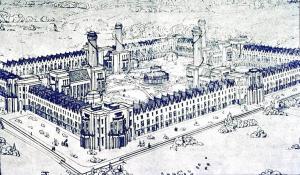
New Harmony - one of the less successful American utopian experiments, based on labour exchange, as envisioned by Robert Owen in the 1820s.
Tomorrow the Free Unit has its first meeting in Eden Grove. My work this year is the continuation of work from last year, and as such have failed to come up (just yet) with a radically fresh approach to take RARA in for this year.
Last year my investigations into RARA through the Free Unit took me through a rather multi-faceted year, including:
– the building of a small sleeping pod in the workshop to house a Belgian intern – and introducing him to east London’s landscape through its waterways;
– attempting to organise a barge of beer to navigate said canals during the London Festival of Architecture 2010;
– curating an exhibition of RARA work and other related topics; and
– investigating the dark belly of masonic architecture and proposing a RARA that housed a satellite barge and ceremony space/brewery for redundant architects – an HQ to rival RIBA’s Portland Place premises.
From a brief discussion with Robert last week, I shall be expected to make a ‘quantum leap’ for this year’s project. This leap hasn’t made itself evident yet. However, I am interested in researching methods of networking, as this is an aspect that has so far not been seriously considered at RARA. An interactive database mixed with some Linked In?
This is an idea I had over the summer, as we advertised for some help on dezeen.com for the construction of a small opera stage. We were inundated with emails. I felt there must be a way to get all these people to have a look at each other’s portfolios + cvs, and find a way for them to start their own projects. However, would be a shame to waste this year designing a complicated website? And what of the tectonic proposal?
